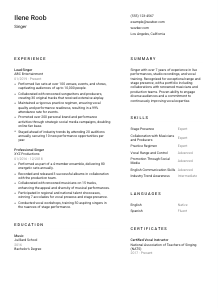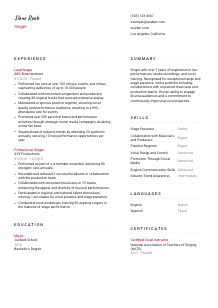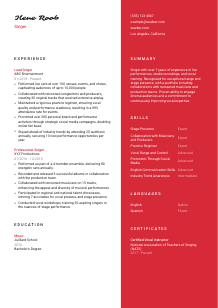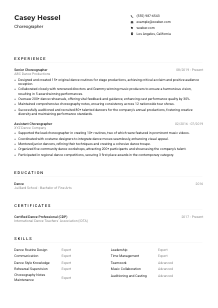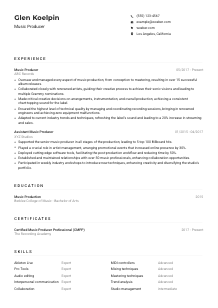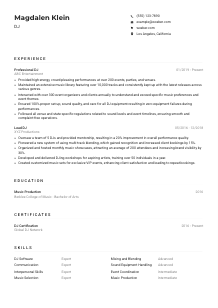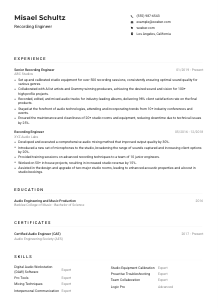Singer CV Example
Hitting high notes, but your CV feels off-key? Harmonize your credentials with this Singer CV example, performed using Wozber free CV builder. Discover how you can fine-tune your vocal talents to resonate with job preferences, ensuring your career hits all the right pitches!
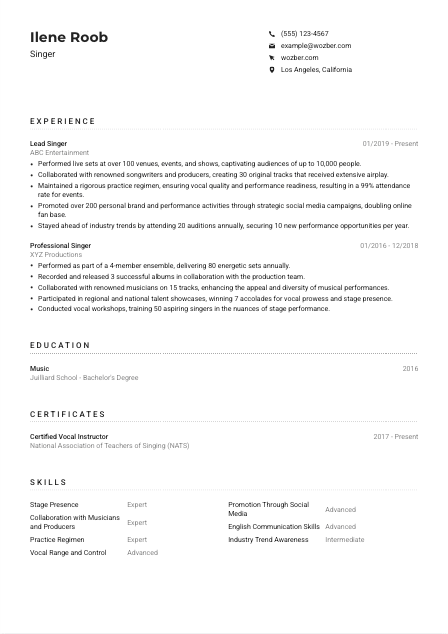
How to write a Singer CV?
Hello, aspiring superstar! In the dynamic world of music and performance, standing out requires more than just an impressive vocal range—it requires a masterfully crafted CV. Fear not; you're about to discover how to fine-tune your credentials to hit every note perfectly for your dream Singer position.
Using the Wozber free CV builder, designed with ATS optimisation in mind, you'll learn to orchestrate a CV that not only showcases your talents but also speaks the language of Applicant Tracking Systems. So, take a deep breath, and let's dive into the world of creating a Singer CV that resonates with industry standards and lands you the spotlight.
Personal Details
A strong opening act sets the tone for the entire performance, and in your CV, the Personal Details section is precisely that. Let's harmonize your basic info with the specific requirements for a Singer, ensuring your introduction hits the right chord with the hiring managers.
1. Name Tuning
Consider your name the headline of your personal brand. Make sure it stands out by opting for a font that's simple yet bold. Your name should be the marquee attraction, so don't hesitate to give it the spotlight with a size that sings.
2. Stage Title
Just beneath your name, specify your professional title—"Singer" in this case. Direct alignment with the job description's title ensures you're instantly recognized as a fit for the role, harmonizing your intentions with the hiring manager's expectations.
3. Contact Crescendo
Ensure your contact details crescendo clearly and accurately. A typo in your phone number or email address can mean a missed callback for an audition. Stick to a professional email format using your name, and ensure your phone number is up to date.
4. Location Spotlight
Highlighting your presence in or willingness to relocate to Los Angeles, California, as mentioned in the job description, immediately positions you as a practical candidate. It emphasizes your readiness and eliminates any concerns regarding relocation logistics.
5. Digital Encore
In today's digital age, having an online presence can be your encore. Including a professional website or a portfolio link allows hiring managers to witness your performances and musical projects, providing them with a sneak peek into your capabilities.
Takeaway
Your Personal Details section isn't just routine information; it's the opening note that sets the stage for your CV's performance. This is your chance to make a memorable first impression, so ensure every detail is perfectly pitched to the needs of the Singer role you're targeting.





Experience
The Experience section is your main act, where you highlight your professional journey and accomplishments. In the world of music, not just any experience will do; it has to resonate with the role of a Singer. Let's orchestrate your past roles and achievements in a way that showcases your star quality.
- Performed live sets at over 100 venues, events, and shows, captivating audiences of up to 10,000 people.
- Collaborated with renowned songwriters and producers, creating 30 original tracks that received extensive airplay.
- Maintained a rigorous practice regimen, ensuring vocal quality and performance readiness, resulting in a 99% attendance rate for events.
- Promoted over 200 personal brand and performance activities through strategic social media campaigns, doubling online fan base.
- Stayed ahead of industry trends by attending 20 auditions annually, securing 10 new performance opportunities per year.
- Performed as part of a 4‑member ensemble, delivering 80 energetic sets annually.
- Recorded and released 3 successful albums in collaboration with the production team.
- Collaborated with renowned musicians on 15 tracks, enhancing the appeal and diversity of musical performances.
- Participated in regional and national talent showcases, winning 7 accolades for vocal prowess and stage presence.
- Conducted vocal workshops, training 50 aspiring singers in the nuances of stage performance.
1. Setlist Selection
Begin by reviewing the job description and selecting experiences that directly align with the listed requirements. Whether it's performing live at events or collaborating with other artists, ensure each point harmonizes with what's being sought after in the Singer position.
2. Perfect Pitch
Structure your experience in reverse-chronological order, showcasing your most recent performances first. For each role, include your title, the name of the company or venue, and the dates of your engagement. This layout sings of professionalism and makes it easy for hiring managers to trace your career melody.
3. Encore Achievements
For each position you've held, highlight your crowning achievements. Use action verbs and quantifiable results to demonstrate the impact of your performances, such as "Performed live sets at over 100 venues, captivating audiences up to 10,000 people." This shows not just participation but prominence in your role.
4. Audience Engagement
Quantify your achievements wherever possible. Numbers aren't just for accountants; they give life to your contributions. Whether it's the size of audiences you've entertained, albums recorded, or original tracks created, these figures amplify your successes, making your experience sing to the hiring manager.
5. Relevant Repertoire
While uniqueness in the music industry is a virtue, ensure the experiences you list are relevant to the role of a Singer. Irrelevant side gigs can dilute the potency of your CV. Focus on those experiences that directly contribute to your narrative as a captivating performer.
Takeaway
Your experience section is the highlight reel of your professional performance. It should resonate with the role you're aspiring to, hitting every note of the job description. Tailor it meticulously, ensuring that every entry demonstrates your capability and passion for the music industry. Let your experience sing the story of your journey.
Education
The Education section may seem like a formality, but in the music industry, it's part of your repertoire. For a Singer, having a solid educational background in music isn't just about credentials; it's evidence of your dedication to your art. Let's tune your education details to strike a chord with hiring managers.
1. The Right Key
First, identify the foundational requirement from the job description—Bachelor's degree in Music or relevant field. This aligns perfectly with your skilled artistry and shows a commitment to honing your craft. Including this detail is non-negotiable and establishes your fundamental qualifications.
2. Academic Symphony
Present your education in a clear, straightforward manner. List your degree, field of study, institution name, and the year you graduated. For instance, if you've graduated from Juilliard School with a Bachelor's Degree in Music in 2016, this instantly elevates your CV's value.
3. Harmonizing Courses
If particularly relevant courses or projects significantly contributed to your expertise as a Singer, mention them. This can be especially persuasive if you're in the early stages of your career or if your education directly supports the specialized skills the job requires.
4. Crescendo Achievements
Include any honors, awards, or recognition you received during your education. These accomplishments resonate with dedication and talent, providing a fuller picture of your capabilities and commitment. They can be particularly persuasive, echoing your passion and potential.
5. Full Orchestra
Consider adding music-related extracurricular activities or memberships in music societies. Participation in music clubs, ensembles, or national music organisations not only displays your passion but also your ability to collaborate and engage with the music community, a crucial aspect of being a successful Singer.
Takeaway
The Education section is a testament to your technical proficiency and foundational skills as a Singer. It's essential to craft this part in perfect harmony with the job requirements, emphasizing your relevant qualifications and extracurricular involvements. Let your education resonate with your dedication to music and performance.
Certificates
In the constantly evolving music landscape, certificates serve as high notes that differentiate you from other artists. They signal your commitment to continuous improvement and professional development. Here's how to include certificates that sing to your qualifications for the Singer role.
1. Identify Relevant Accolades
Start by understanding which certifications, if any, directly align with the Singer's role. For example, being a "Certified Vocal Instructor" by the National Association of Teachers of Singing (NATS) showcases not just your expertise but also your commitment to the craft.
2. Selection Solo
Less is more. It's tempting to list every certificate you've ever achieved, but focu...ing on those most relevant to singing, vocal performance, or music interpretation presents a curated impression of specialization and dedication.
3. Timely Tones
For certificates with a validity period or recent achievements, noting the date shows your continuous engagement with your profession's evolving demands. This commitment to staying current in your field resonates well with prospective employers.
4. Seek out New Melodies
The music industry doesn't stand still, and neither should you. Actively pursuing further certifications, especially those recognized by the industry or those that can give you an edge in digital music spaces, can be incredibly valuable. Always be on the lookout for opportunities to amplify your qualifications.
Takeaway
Certificates are like solos—they showcase your unique skills and dedication. Including relevant certifications on your CV plays a pivotal note in demonstrating your commitment to professional development and excellence in the music industry. Let them sing of your readiness to take the stage.
Skills
The Skills section of your CV is where you highlight your technical toolkit and soft skills harmony. For a Singer, the right mix of vocal prowess, performance skills, and personal attributes can set the stage for success. Let's dive into how to curate this section with the perfect pitch.
1. Listening to the Lyrics
Start by distilling both explicit and implicit skills from the job description. This isn't just about your vocal range or genres you excel in; it's also your ability to engage with audiences and collaborate with other music professionals.
2. Fine-Tuning Your Playlist
Match your personal skills inventory with the job requirements. This should be a carefully curated list, focusing on what makes you stand out as a Singer. From "Exceptional Vocal Range and Control" to "Effective Collaboration with Musicians and Producers," make sure every skill resonates with the role.
3. Arrangement Harmony
Resist the temptation to list every skill you think you have. Prioritize those that align closely with the job description and place them in a way that's easy to read and understand. A well-organized Skills section sings more harmoniously to recruiters.
Takeaway
Your Skills section is a showcase of the unique talents you bring to the stage. Approach it as a carefully composed setlist, featuring only the best of your repertoire. This is your chance to highlight why you're not just a match for the Singer role but the star they're seeking. Keep fine-tuning, and make your skills shine!
Languages
In the global symphony of music, the ability to communicate in multiple languages can amplify your appeal as a Singer. Whether it's singing in different languages or engaging with a diverse audience, showcasing linguistic skills can be a significant asset. Let's explore how to tune this section for an encore performance.
1. Review the Lyrics Sheet
Check if the job listing emphasizes any specific languages, like "Effective English communication skills are a must." This isn't just about being able to sing in English; it's about engaging with diverse audiences, collaborators, and the press effectively.
2. Vocal Range Expansion
Start with prioritizing the essential languages for the role and then list any additional languages you are fluent in. For instance, being fluent in Spanish can be a valuable asset for collaborating with international artists or performing in multilingual sets.
3. Language Proficiency Scale
Be honest about your level of proficiency. From "Native" to "Basic," clearly indicating your ability in each language helps set realistic expectations and showcases your global potential as a Singer.
4. Multilingual Medley
If your career as a Singer involves or could benefit from international exposure, emphasizing your multilingual skills can be particularly appealing. It demonstrates your versatility and readiness to connect with audiences beyond linguistic barriers.
5. Continuous Learning
The world of music is as wide as it is diverse; continuing to learn and add languages to your repertoire can open new doors and audiences. Consider this an ongoing part of your professional development, much like mastering new songs or genres.
Takeaway
Your ability to speak multiple languages is a testament to your versatility and global appeal as a Singer. Highlighting your linguistic skills can open up new arenas for performance and collaboration. Let your languages section sing of your readiness to embrace the world's stages, connecting with audiences far and wide.
Summary
The Summary is your spotlight moment before you dive into the details of your performance-ready CV. Think of it as your opening number, setting the stage for what's to come. Here's how to craft a compelling narrative that captures the essence of your artistry.
1. Tuning into the Role
Immerse yourself in the job description and align your summary with the key requirements. Being a Singer isn't just about the voice; it's about stage presence, versatility across genres, and the magic of engagement. Reflect these highlights upfront.
2. Opening Act
Start with a strong introduction that encapsulates your professional identity—"Singer with over 7 years of experience in live performances, studio recordings, and vocal training." This sets the tone, promising an engaging journey through your career.
3. Headlining Achievements
Mention a few key achievements and skills that directly address the job's requirements. This is your chance to shine by showcasing your unique selling points, such as a wide vocal range, engaging stage presence, or successful collaborations with musicians.
4. Curtain Call
Keep it concise yet impactful. The Summary is merely an introduction to the remarkable show that is your CV. Aim for 3-5 lines that invite the reader to dive deeper into your achievements, skills, and the unique value you bring as a Singer.
Takeaway
The Summary section is your chance to command the stage from the moment the curtains lift on your CV. It should capture the essence of your artistry and professional journey, enticing hiring managers to learn more. Tailor it to the role, and let your capabilities perform the opening number for your story.
Launching Your Singer Journey
Congratulations on completing this backstage tour of crafting a pitch-perfect Singer CV. With these insights, flavored with your unique talents and experiences, you're ready to take center stage in the job market. Remember, your CV is the opening act to your career performance—make it memorable. Let the Wozber free CV builder be your agent, assisting you in creating an ATS-compliant CV that not only resonates with hiring managers but also serenades the algorithms of Applicant Tracking Systems.
Go ahead, fine-tune your CV with Wozber, and prepare to take the spotlight. The stage is set, and the audience awaits. Break a leg!

- Bachelor's degree in Music or relevant field.
- Minimum of 3 years' professional singing experience, or equivalent training from a reputable performing arts school.
- Exceptional vocal range and control with proficiency in multiple genres.
- Strong stage presence and ability to engage with audiences of all sizes.
- Ability to collaborate effectively with musicians, producers, and other industry professionals.
- Effective English communication skills are a must.
- Must be located in or willing to relocate to Los Angeles, California.
- Perform live sets at various venues, events, and shows, both solo and as part of an ensemble.
- Maintain a rigorous practice regimen to ensure vocal quality and performance readiness at all times.
- Collaborate with songwriters, producers, and recording engineers to create and refine original material or covers.
- Promote personal brand and performances through social media, press appearances, and other marketing channels.
- Stay up to date with industry trends, attend auditions, and actively seek out new performance opportunities.





